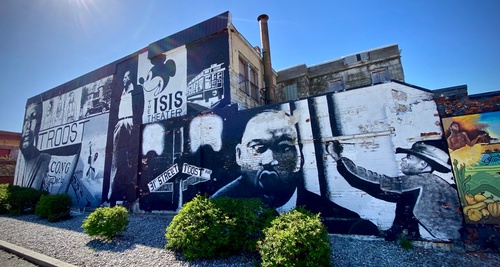
VIRTUAL PROGRAM | Courageous Conversations | The Great Divide: How the Racial Wealth Gap is Hurting Us All
It could take more than 200 years for the average black family to accumulate the same amount of wealth as a similar white family due to disparities in generational wealth and systemic inequalities. But how do you accumulate wealth in the United States? For most Americans the foundational tools for building wealth and financial well-being are homeownership and quality affordable rental housing. While lawmakers have sought to make it easier for citizens to access these tools, the efforts have almost exclusively benefited white households and displaced people of color, denying them access to the same wealth-building opportunities and segregating them into isolated communities.
This residential segregation has resulted in a type of tribalism that sees people from different races and social classes as “others” who we are in competition with for resources. This scarcity mindset is reinforced by policies and regulations that exaggerate divisions, both politically and ideologically, and provide little incentive for change.
Kansas City has an unfortunate history of redlining and have heard about “The Troost Divide.” While progressive efforts have taken place over the years to erase the stigma attached to Troost, are they enough and are they helpful?
Join our panelists as we discuss:
- Barriers to wealth building and accumulation for people of color
- Tribalism as it relates to residential segregation
- Importance of small business and minority-owned business support during pandemic
- Local efforts for improvement and neighborhood impact
Speaker Bios
 Justice Horn is a community leader, social justice activist, and political strategist. He fights for representation everywhere and broke barriers as the first openly gay multicultural college wrestler in the NCAA. Now in politics, he worked on the Biden campaign in the African American, LGBTQ, and Pacific Islander division of the 2020 Joe Biden Presidential campaign. He was also senior advisor to the Missouri for Biden team as well. As an African American, Caucasian, Pacific Islander, Native American, and LGBTQ individual, he represents the many communities he comes from. He currently serves on the Jackson County Prosecuting Attorney's Advisory board, the Jackson County Children Services Board, the Kansas City Streetcar Advisory committee, and is he serves as the At-Large Commissioner of the Kansas City LGBTQ Commission. He’s one of the many voices of the future here in our community.
Justice Horn is a community leader, social justice activist, and political strategist. He fights for representation everywhere and broke barriers as the first openly gay multicultural college wrestler in the NCAA. Now in politics, he worked on the Biden campaign in the African American, LGBTQ, and Pacific Islander division of the 2020 Joe Biden Presidential campaign. He was also senior advisor to the Missouri for Biden team as well. As an African American, Caucasian, Pacific Islander, Native American, and LGBTQ individual, he represents the many communities he comes from. He currently serves on the Jackson County Prosecuting Attorney's Advisory board, the Jackson County Children Services Board, the Kansas City Streetcar Advisory committee, and is he serves as the At-Large Commissioner of the Kansas City LGBTQ Commission. He’s one of the many voices of the future here in our community. Brent Never is an Associate Professor of Public Affairs in the Henry W. Bloch School of Management at the University of Missouri-Kansas City. His work in the Kansas City community has focused on how community members can leverage data in order to shape the future contours of their own neighborhoods. In 2018, he and colleagues won an Alteryx Excellence Award for creating a system for buyers of Land Bank homes to better understand the context of their future neighborhood. He currently directs the UMKC Institute for Data Education, Analytics and Science (IDEAS), a campus-wide initiative to bring data science to students as well as the Kansas City region.
Brent Never is an Associate Professor of Public Affairs in the Henry W. Bloch School of Management at the University of Missouri-Kansas City. His work in the Kansas City community has focused on how community members can leverage data in order to shape the future contours of their own neighborhoods. In 2018, he and colleagues won an Alteryx Excellence Award for creating a system for buyers of Land Bank homes to better understand the context of their future neighborhood. He currently directs the UMKC Institute for Data Education, Analytics and Science (IDEAS), a campus-wide initiative to bring data science to students as well as the Kansas City region. Megan Voepel was born and raised in Kansas City, but just recently learned about its meaningful history. After completing her production work for a crime investigation show, Megan began asking questions about city divides. She wrote and produced a 25-minute documentary, TRIBE, that explores the subject of urban development as it relates to tribalism across major cities across America.
Megan Voepel was born and raised in Kansas City, but just recently learned about its meaningful history. After completing her production work for a crime investigation show, Megan began asking questions about city divides. She wrote and produced a 25-minute documentary, TRIBE, that explores the subject of urban development as it relates to tribalism across major cities across America.  Dr. Rebecca Baumgartner is the Senior Diversity & Inclusion Manager for Ogletree, Deakins, Nash, Smoak & Stewart, P.C., an AMLaw 100 law firm. With a background in Human Performance Improvement and a Certified Diversity Executive, she works strategically with organizations to remove systemic barriers to equity and inclusion. She has been a featured speaker for organizations such as National Association for Legal Professionals, Association of Law Firm Diversity Professionals, Tulane School of Law, Central Exchange, and the Professional Development Consortium.
Dr. Rebecca Baumgartner is the Senior Diversity & Inclusion Manager for Ogletree, Deakins, Nash, Smoak & Stewart, P.C., an AMLaw 100 law firm. With a background in Human Performance Improvement and a Certified Diversity Executive, she works strategically with organizations to remove systemic barriers to equity and inclusion. She has been a featured speaker for organizations such as National Association for Legal Professionals, Association of Law Firm Diversity Professionals, Tulane School of Law, Central Exchange, and the Professional Development Consortium.About the main photo: "The street is named after the first physician to reside in Kansas City, Dr. Benoist Troost... Troost Avenue has been continuously developing from 1834 into the 1990s, including movie theaters and apartments... Troost Avenue has historically served as a dividing line of racist segregation and disinvestment in Kansas City, with more white residents living west of Troost and more black residents living to the east. For decades, this line was legally enforced under Jim Crow laws, which had been templated after the neighborhood system of house deed covenants blocking homeownership or occupancy by Blacks and Jews, which had been written by Kansas City real estate developer J.C. Nichols." (source: Wikipedia)
Photo credit by Smuckola - Own work, CC BY-SA 4.0, https://commons.wikimedia.org/w/index.php?curid=91985921

Date and Time
Friday Jun 18, 2021
11:30 AM - 1:00 PM CDT
Location
Webinar via Zoom - access this program remotely from your computer, tablet, or smartphone + dial-in available.
Fees/Admission
$0.00 Members
$25.00 Nonmembers
No refunds.
Interested in membership? More info here.

